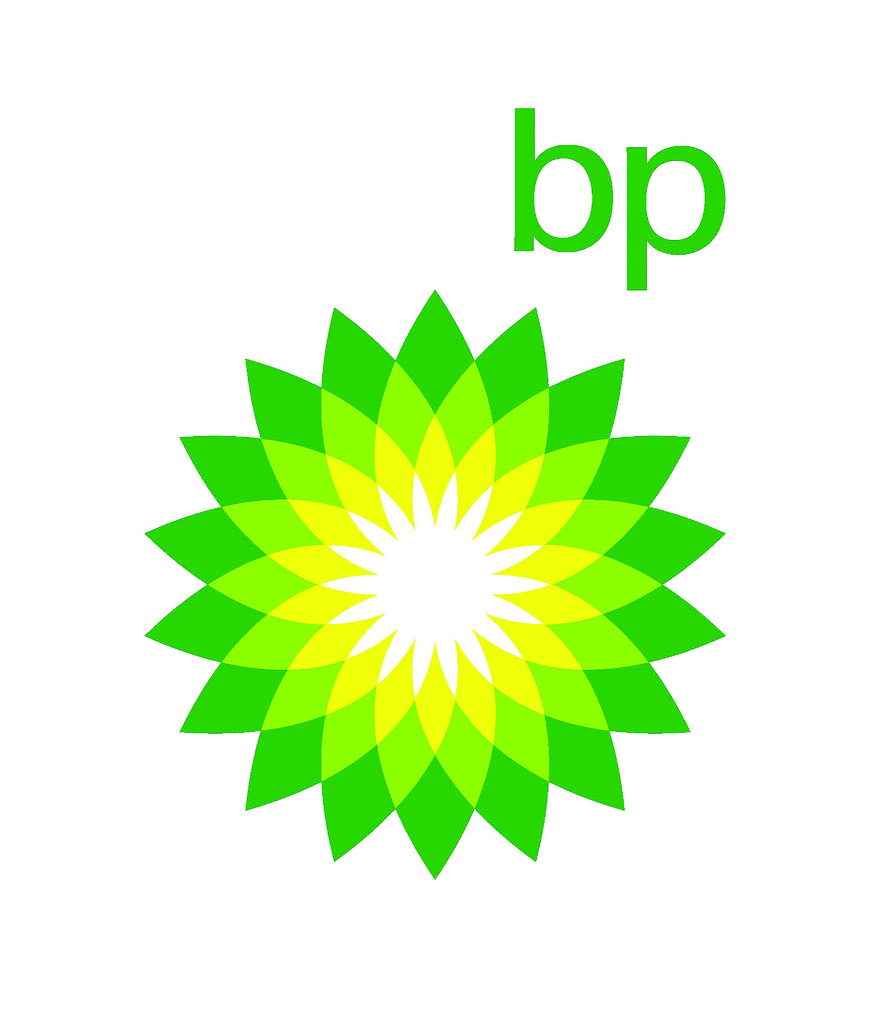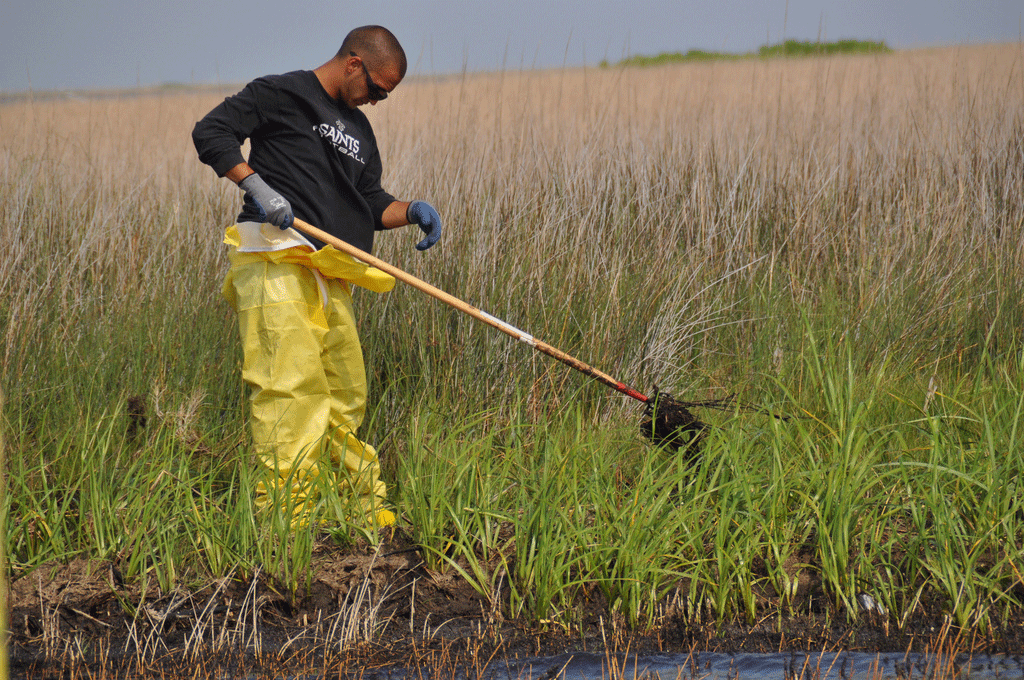BP Set To Expand Oil Drilling in The Gulf
Air Date: Week of March 28, 2014

BP’s logo. Rosenfeld Media, Flickr, Creative Commons 2.0
New Orleans Times Picayune writer Jennifer Larino talks with host Steve Curwood about the recent EPA decision to allow BP to bid for federal contracts and expand drilling for oil in the Gulf of Mexico.
Transcript
CURWOOD: 25 years later, there's still oil from the Exxon Valdez along the shores of Prince William Sound. And after nearly four years, science is still determining the full extent of damage from the massive blowout of BP’s Deepwater Horizon well in the Gulf of Mexico. And now, though BP has yet to be assessed penalties under the Clean Water Act, the Obama Administration has given the company the green light to expand its operations in the Gulf. Jennifer Larino, staff writer at the New Orleans Times Picayune, is on the line to talk about the impact of that decision and the status of the remaining litigation. Welcome to Living on Earth, Jennifer.
LARINO: Hi, thanks for having me.
CURWOOD: So what’s going on now with the EPA decision to allow BP to drill again?
LARINO: Well, basically, back in November 2012, the EPA had put a temporary ban on BP getting federal contracts in light of the criminal charges and eventual admission of BP related to the Deepwater Horizon rig explosion and the ensuing oil spill. So essentially, the EPA said for a temporary time, we’re not going to do business with you, and we cannot give you federal contracts. March 14th the two parties came to an agreement where BP will undergo regular audits of its internal operations, its safety procedures, all those sorts of things and will again be able to vie for federal contracts, whether that be selling oil and gas to the military or vying for bids offshore in the Gulf of Mexico to drill oil and gas there.
CURWOOD: What’s the perception about BP as a better company?
LARINO: Not just BP, but all companies working in the Gulf are going to be under a microscope, essentially. I will say that there are concerns of whether or not the federal government and the agencies overseeing drilling offshore have the manpower to really truly enforce some of these standards that they’re developing and these agreements that they’re meting out. That’s one concern I’ve heard voiced.
CURWOOD: How soon do you think we’ll see BP out drilling again?
LARINO: We’re already seeing it. They have ongoing projects. They’ve committed to spending $4 billion a year over the next decade. BP had ongoing projects before the BP oil spill, 2010 oil spill, so these platforms that are out there, they’re basically bringing the existing wells that they had, bringing them on line and starting oil production. These projects take several years to bring to fruition, so something that might have started before 2010 could just now be coming on line. So we’re seeing a couple of their projects that they had been working on come on line now. In terms of new drilling, that will take a couple more years. For BP, they were one of the largest providers of oil and gas to the US federal government so they definitely want to get in the business again, and that obviously has repercussions for our federal government and how they interact with them.

Raking a marsh during the BP oil spill clean up. Gulf Restoration Network, Flickr, Creative Commons 2.0
CURWOOD: Now how do people in Louisiana, in the Gulf Coast area...how do people feel about BP getting the green light to get back into doing federal contracts, possibly drilling again?
LARINO: Well, that’s a good question. There is a lot of different dynamics when you look at south Louisiana. Many families have people who work in the fishing industry, and also work in the oil patch. So, on the one hand, you do have a large environmental concern from environmental groups in south Louisiana that are looking at coastal erosion, looking at our fishing industries that depend on a clean Gulf, and have legitimate concerns, that not just BP, but everyone operating offshore is doing it safety and observing the rules that keep everything safe. On the other hand, a lot of our economy is tied to the oil and gas industry. A lot of people work offshore and as activity ramps up after the oil spill -- there was a real lull that hit a lot of business very hard -- so as things ramp up, a lot is entangled with that industry and there is support for getting major gas companies like BP back out to work, obviously under safe conditions, but allowing them the opportunity. So you see kind of mixed bag of emotions out here.
CURWOOD: How’s the court case against BP progressing -- or I should say court cases?
LARINO: Oh yes, [LAUGHS] They are embroiled in litigation on multiple fronts. There’s litigation that has to do with the actually spill itself and assigning blame essentially for how much oil was actually spilled, what sort of penalties should stem from that, what were the causes of the spill. A lot of people were in tune with that trial. It has three phases - it’s gone through two already - and it has a third. And the final phase will actually be the penalty phase.
There’s also litigation that has to do with the claims side of things. There was a settlement made in early 2012 that basically dealt with a lot of the seafood claims, a lot of the cleanup worker claims, in one fell swoop, but what we’re seeing now is BP kind of attacking that process moving into 2014 here. They had originally estimated that would cost them about $7.8 billion, now they’re saying that fraud potentially ballooning that estimate of what they’re going to spend, and through litigation trying to figure out a way that they can eliminate fraud, of what say see as fraud in the claim system. So, there’s litigation surrounding that as well.
CURWOOD: I want to thank you for taking this time with us today. Jennifer Larino is a staff writer at the New Orleans Times Picayune. Thanks so much, Jennifer.
LARINO: Thanks for having me.
Living on Earth wants to hear from you!
Living on Earth
62 Calef Highway, Suite 212
Lee, NH 03861
Telephone: 617-287-4121
E-mail: comments@loe.org
Newsletter [Click here]
Donate to Living on Earth!
Living on Earth is an independent media program and relies entirely on contributions from listeners and institutions supporting public service. Please donate now to preserve an independent environmental voice.
NewsletterLiving on Earth offers a weekly delivery of the show's rundown to your mailbox. Sign up for our newsletter today!
 Sailors For The Sea: Be the change you want to sea.
Sailors For The Sea: Be the change you want to sea.
 The Grantham Foundation for the Protection of the Environment: Committed to protecting and improving the health of the global environment.
The Grantham Foundation for the Protection of the Environment: Committed to protecting and improving the health of the global environment.
 Contribute to Living on Earth and receive, as our gift to you, an archival print of one of Mark Seth Lender's extraordinary wildlife photographs. Follow the link to see Mark's current collection of photographs.
Contribute to Living on Earth and receive, as our gift to you, an archival print of one of Mark Seth Lender's extraordinary wildlife photographs. Follow the link to see Mark's current collection of photographs.
 Buy a signed copy of Mark Seth Lender's book Smeagull the Seagull & support Living on Earth
Buy a signed copy of Mark Seth Lender's book Smeagull the Seagull & support Living on Earth

